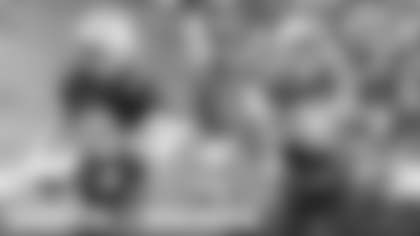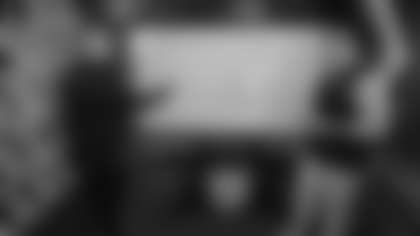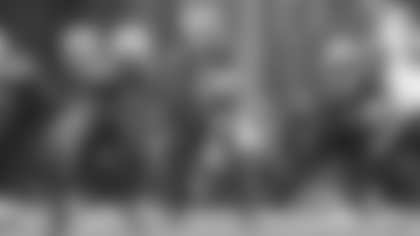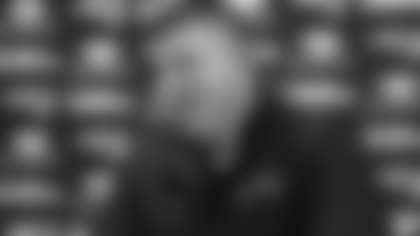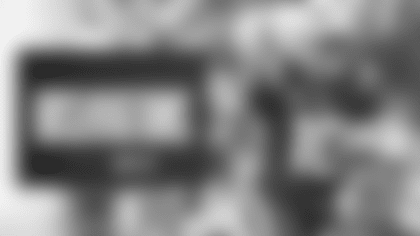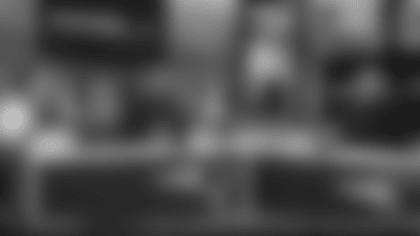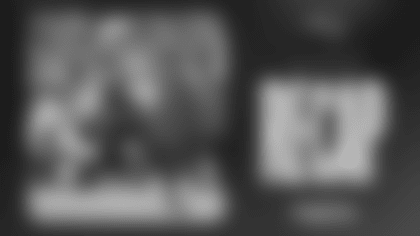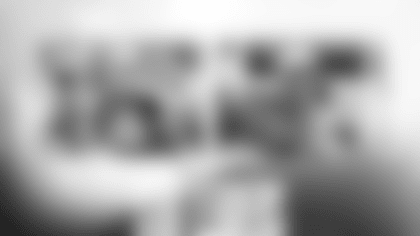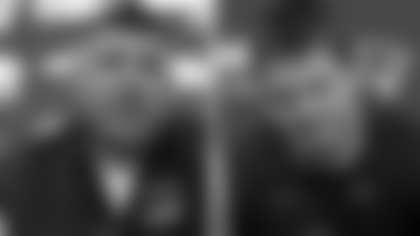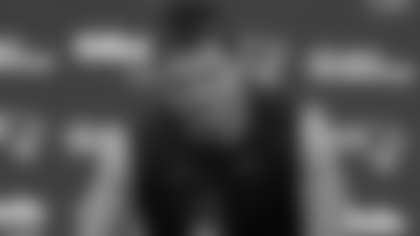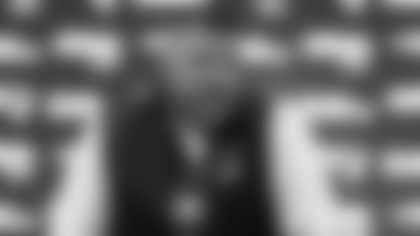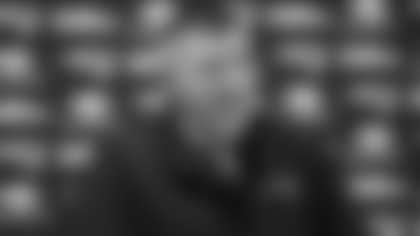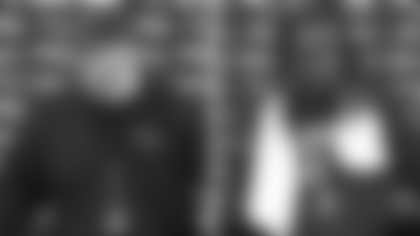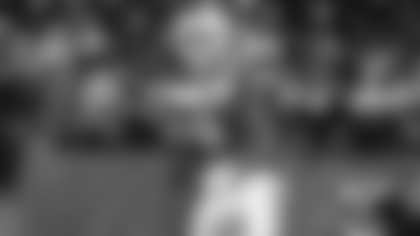Patriots guard Stephen Neal addresses the media to discuss his retirement from Pro Football during a conference call on Thursday, March 3, 2011.
SN: Thank you guys for listening. I'll get started on what I jotted down, so bare with me please. OK, here we go. I never was really one who enjoyed the spotlight, but rather loved sport and competition. My first love was football, but graduating high school at 17-years old and being 6-4 and 215 pounds. limited my opportunities. Wrestling was my best option and I attacked that challenge. Thanks to T.J. Kerr and Darryl Pope, my college coaches at Cal-State Bakersfield, I became a four-time All-American, two-time national champ and a world champion in 1998. In 2000, I failed to make the Olympic team, but that allowed me to meet Neil Cornrich, who was my agent. Thanks to him, he got me to the doorstep of the NFL. So, thanks Neil. Then I met Coach Belichick and he opened that door, so thanks, Coach Belichick. I learned the success and dedication you need in football from Bill and Dante Scarnecchia. The dedication they show, being the first ones in the building and the last ones to leave is something that's truly amazing and it's something he gives us at the Patriots each and every year. So thank you, Dante, for everything. Having success in this league is only possible with great ownership, so I want to thank the Kraft family. They really made me feel like part of the family while I was there. It is truly special what happens in New England and that's something I will definitely miss. The sport of football is a brutal sport and injuries are part of this game. The strength and medical staff here are a huge factor in my success and the team's success. So, thank all of you very much. You all helped me stick around for so long. Of course football is not an individual sport, so I need to thank each and every teammate and coach who have been with me the last 10 years. They have all helped me have success in this game, so thank you guys, thank each and every one of you. Without the media and the fans, the sport would not be at the level it is at, so I'd like to thank all of you for all of the coverage and support you've shown me through the years. We definitely have the greatest fans in the country and being in New England with the Red Sox, Celtics, Bruins and Pats all having success is such a great environment, something I will never forget. I also want to recognize two good friends I've made in New England. Chris Robertson, who is my go-to guy at Stop & Shop - he is a great guy. Thanks Chris. And Rich Burns who is a great fan, friend neighbor and great guy. Thank you Rich. I'll give you a call in a day or two. All this is really possible because of my family. My mom, my dad, Mike and Dave - my brothers, they always believed in me and never doubted my dreams. They were always there for me. My wife, Jodi, put everything down in Bakersfield to follow me out here to New England. She's been my support throughout this entire journey, always there for me after wins, losses, injuries, everything with her arms wide open. She's there raising our beautiful girls, Colby and Jillian and our stubborn copy of me, Gunnar, my little guy. I just can't wait, my family is my new team and I hope we can go undefeated for the rest of our lives. So, thank you guys.
Q: When you think back on your career, what memory stands out the most?
SN: I think two really stand out the most. The first one is from 2002, the first game I played in Green Bay, I get into the huddle and I'm starting the game. I'd never been in the huddle for a real game, just for preseason. So I look around the huddle. I'm a pretty good judge of people. I just look at Tom Brady, the returning Super Bowl MVP, sitting there, and he has confidence in each and every one of us in that huddle. I'm like, 'Why should you believe in me? I'm just some wrestler who is here.' The confidence he showed in me truly shows the leadership qualities he possesses because you can't do it alone. You need each and everyone there doing their job. That moment right there made me feel like this was really happening and the start of something special. And definitely, in 2005, when we won the Super Bowl against Philly, that was something I'll never forget because I was actually playing in that Super Bowl. Winning a championship by yourself is great, but winning with teammates and coaches and a training staff is something even better because you can celebrate with each and every person and say, 'We did this thing together.' You all have the same feeling instead of an individual sport where you have the feeling by yourself.
Q: Have you had a chance to reflect on your career and how far you've come from not playing college football to winning three Super Bowls?
SN: Just the last couple days, I've been thinking about it. It's been a great journey and I've tried to mention a couple of people who have helped me get there. Dante Scarnecchia, I tell you what, he's probably one of the greatest coaches to ever have coached this game. He sits down with each and every new guy and tries to make sure everyone is on the same page. He tries to bring them up. He spends so much of his own personal time, which he has none of, trying to get everyone ready to go. To just have an offensive line, where over the last few years with injuries and people coming in and out, there's no lull there. That has to be the coach. I just think he's a tremendous coach. And Coach Belichick - there's no excuses. It doesn't matter who you are. Everyone has to do their job and do it well or there's a problem. It doesn't matter if you're a superstar or a wrestler. If you did good, he'll say you did good and if you're bad, he'll tell you that too. It's great being in an environment where it's fair and everybody wants to win. I've been so fortunate to be around here for so long.
Q: What ultimately caused you to come to this decision?
SN: Well, there were a couple things. In my mind, I've always had something to shoot for. For me not to have that, I'm just not sure what's going to happen. I always want to have a chance to do something. Talking to the doctors, trainers and coaches, realistically, there's a shot I can play, but it's not a very good shot. If I get injured again, it's not going to be too good. I have a great family and I want to be there for them. I want to be able to throw a ball better with my right hand than my left, which I'm working on right now. That's kind of what it comes down to. The decision needed to be made, so I figured this is the best time to do it.
Q: So it boils down to uncertainty over a lingering injury going forward, age, the labor situation and not knowing how that injury was going to progress?
SN: Definitely, when they tell you that the next step is something extreme. The next injury will be significant, if there is another injury- that kind of scares you a little bit. I've been kind of limited the last four or five years. I just tried to do the best I can. I think we have a great group of guys who can go on and have great success. I'd love to stick around and watch the younger players develop. It's great being on a team with so much young talent. There's so much potential. You want to try to stick around for as long as you can, but realistically it's really not fair to stick around when you can't pull your own weight. Like I said, I have so much respect for Coach Belichick. I've always tried to put the team first in everything I've done and I think the team will be better without me, so definitely I think this is the time to step down. For my own health and my family, I think this is the best decision also. To walk away with a little bit of life left in the body. Hopefully, I can get this shoulder rehabbed to a decent level and live the rest of my life pretty close to pain free. That's what I'm hoping for.
Q: Have you thought about what you want to do next beyond being a father?
SN: Well after this phone call I have to clean the floors with the wife and do some laundry, which I don't mind doing. I love spending time with the family. I'd really like to help the sport of wrestling. It has taught me so much stuff - hard work, dedication. And I'd love to give back to the sport anyway. The sport's dying as we discussed last year. I really want to try to help out my program and keep it going, and they're doing a pretty good job. [Cal State Bakersfield] has a new athletic director, so I'm going to talk to him this weekend and see what I can do to help. I have so much passion in my heart for wrestling that I don't want to see the sport die. I want to see it change the lives of other young athletes the way it changed mine. That's one thing I want to do right off the bat, just try to go around and help raise money or help raise awareness for all these different programs and see if we can get them to stop folding on the West Coast.
Q: With the lockout looming tomorrow and the fact you would not have had access to the team trainers and doctors, was that a factor in your decision to retire?
SN: Yeah definitely. You're not actually allowed to talk to them and communicate with them. Now that I'm retired, I can communicate openly with them. I'm actually out here in California. I'm doing my rehab out here in San Diego. So, I'm out here around my family and we played miniature golf last night for my daughter's birthday. It's great to be with the family and looking forward, looking ahead. It's going to be awesome watching the Patriots on TV in warm San Diego, and not freezing my tail off on the sideline or up in the booth or something. I'm pretty excited about it. With a potential lockout looming, I really hope the owners and players can get everything together because it's not them who is going to be hurting. It's all those people on the support staff. The people who work in the cafeteria, the people who clean up the locker room and the people who park the cars for the games; those are the ones who are going to be hurt the most because they won't have a job unless it gets resolved. So I hope everyone can put everything aside and work out a deal so the support staffs for the entire stadiums all over the league can get back to work and not have to change careers.
Q: Did you always look at yourself as a wrestler first who got good at being a football player?
SN: I always had a passion for football. To be completely honest with you, I always thought I was going to be catching the ball instead of blocking or trying to sack the quarterback instead of protecting him. But, things turned out how they did and I'm an offensive lineman. I love every aspect of that. We know the snap count. We know where the ball's going. That's the great thing. Wrestling really... I just started wrestling in ninth grade. I didn't really know anything about the sport. I was challenged to do it. I was told that it was harder than football but I didn't believe it. All the battles I've had in wrestling taught me so much about sport, about life, about competition. Those are lessons I'll never, ever forget. If you want something bad enough, you have to fight for it. If you really care about something, you're going to fight so hard for it that you'll either get it or die. That's a lesson I'll never forget. I truly believe I can do anything I want to do, which is kind of hard to hear the doctors tell me I shouldn't play anymore, that kind of stuff. It's kind of hard to hear it with that mentality. At some point you have to just accept it and move on to the next challenge. As a wrestler, you never want to back down. So, I'll always be a wrestler. But football is a true love of mine and I was so fortunate I got to play at the highest level and for a great organization and team.
Q: What would have been the consequences for you had you been hurt again?
SN: The next option would have been that they would have to replace a bunch of stuff in [my shoulder], so I'm good with all my parts. I think I can say anything I want now that I'm retired, right?



